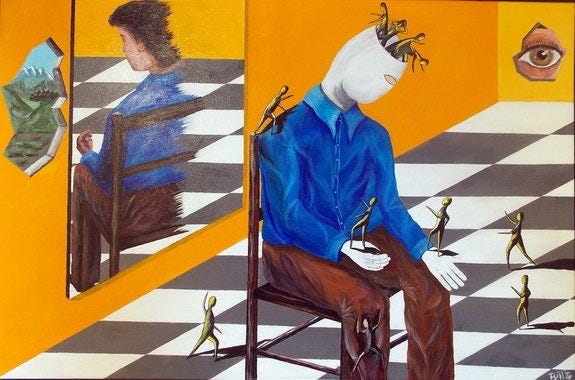Possession is our normal condition
"The places where one could collapse for a few minutes out of sight were all known, and never mentioned."
This World depends on demons we take for granted; it inheres in the transparent, the invisible. When I reflect upon my true position, I am treading water in a sunless sea; all these boats, let alone the land—all are as illusions. This is the cage with which we comfort ourselves, calcified outwards as so much self. Death is the grit around which our treasured pearl forms: what is it to confront this?
She is cold—but again, what does that mean? I am blind here, as ever; it is for each to trace with uncertain hands, as ought always be our first task. To resituate the individual is to recover the body, that is, to inhabit myself as against the manipulation of but another object among many. Reject, therefore, that false spiritual humility that seeks only to demean man, to tell each there is no true centre in this vast universe—instead know this: you are the world; each dies alone.
This ought, of course, be self-evident; still everywhere the individual is placed and places themselves as a thing amid things. This way we only seem to see—but of course, we are blind. The truth is not to be seen or said but, as directly by embodiment, with hands and heart, to be felt and done. God is dead, perhaps, yet we cannot so easily overcome our finite flesh; we inherit neither omniscience nor omnipotence. Reason, that murderer and prostitute, seizes His throne only as rex Nemorensis:
Those trees in whose dim shadow
The ghastly priest doth reign
The priest who slew the slayer,
And shall himself be slain.
Hence follows the cult of human reason—that all ought be rational, or rendered so, as much in science and law as life. Certainly there is something here, yet still the idea troubles me. There is a lie in it, as always ‘rational’ seems rather to mean only that a thing be justifiable somehow as by mere words. We are reasonable to the extent we can persuade others as much, all judges and psychiatrists alike—man as utmost measure.
These are the eyes we take for our own, whereby we play ourselves as marionettes, those of other and the all-too-many; it is behind them that we hide from Him. Yet most religions agree this at least: that as individual each is judged alone. There is thus no true justification in the way of them or many. All may well agree with your choice, nonetheless, we feel something in us often asks for more; or have we silenced ourselves? No, surely no crowd can quell this calling to more—still it tears me, at least.
Or perhaps I place too great a trust in men, that is, in myself—or is it that all this is simply too complicated? Once there was land, now there seem only institutions and inertia. My own dissolution echoes the world. All this signs the end of sure tradition; that foundation for which so many yearn in vain: now is the time of the flood. Some say, at least, that there is in this an admirable difficulty:
If I am capable of grasping God objectively, I do not believe, but precisely because I cannot do this I must believe. If I wish to preserve myself in faith I must constantly be intent upon holding fast the objective uncertainty so as to remain out upon the deep, over seventy thousand fathoms of water, still preserving my faith.


